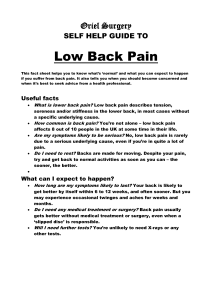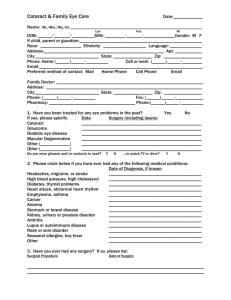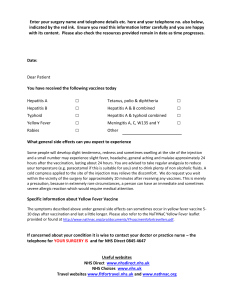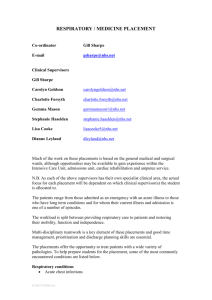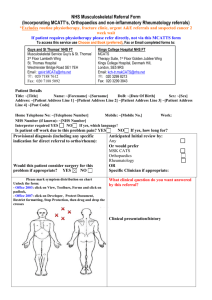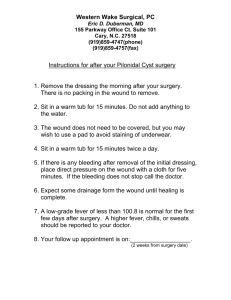Introduction - My Surgery Website
advertisement
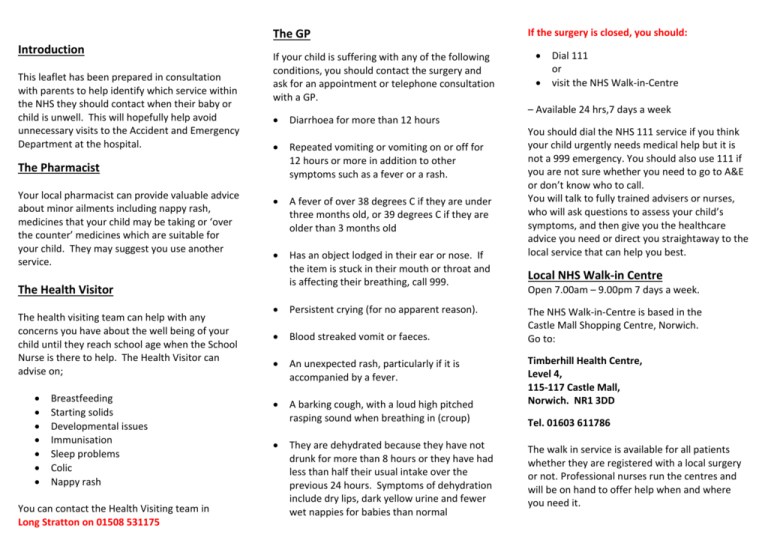
The GP Introduction This leaflet has been prepared in consultation with parents to help identify which service within the NHS they should contact when their baby or child is unwell. This will hopefully help avoid unnecessary visits to the Accident and Emergency Department at the hospital. If your child is suffering with any of the following conditions, you should contact the surgery and ask for an appointment or telephone consultation with a GP. Repeated vomiting or vomiting on or off for 12 hours or more in addition to other symptoms such as a fever or a rash. A fever of over 38 degrees C if they are under three months old, or 39 degrees C if they are older than 3 months old Has an object lodged in their ear or nose. If the item is stuck in their mouth or throat and is affecting their breathing, call 999. The Pharmacist Your local pharmacist can provide valuable advice about minor ailments including nappy rash, medicines that your child may be taking or ‘over the counter’ medicines which are suitable for your child. They may suggest you use another service. The Health Visitor The health visiting team can help with any concerns you have about the well being of your child until they reach school age when the School Nurse is there to help. The Health Visitor can advise on; Breastfeeding Starting solids Developmental issues Immunisation Sleep problems Colic Nappy rash You can contact the Health Visiting team in Long Stratton on 01508 531175 Diarrhoea for more than 12 hours Persistent crying (for no apparent reason). Blood streaked vomit or faeces. An unexpected rash, particularly if it is accompanied by a fever. A barking cough, with a loud high pitched rasping sound when breathing in (croup) They are dehydrated because they have not drunk for more than 8 hours or they have had less than half their usual intake over the previous 24 hours. Symptoms of dehydration include dry lips, dark yellow urine and fewer wet nappies for babies than normal If the surgery is closed, you should: Dial 111 or visit the NHS Walk-in-Centre – Available 24 hrs,7 days a week You should dial the NHS 111 service if you think your child urgently needs medical help but it is not a 999 emergency. You should also use 111 if you are not sure whether you need to go to A&E or don’t know who to call. You will talk to fully trained advisers or nurses, who will ask questions to assess your child’s symptoms, and then give you the healthcare advice you need or direct you straightaway to the local service that can help you best. Local NHS Walk-in Centre Open 7.00am – 9.00pm 7 days a week. The NHS Walk-in-Centre is based in the Castle Mall Shopping Centre, Norwich. Go to: Timberhill Health Centre, Level 4, 115-117 Castle Mall, Norwich. NR1 3DD Tel. 01603 611786 The walk in service is available for all patients whether they are registered with a local surgery or not. Professional nurses run the centres and will be on hand to offer help when and where you need it. Accident and Emergency at the Hospital WHEN TO DIAL 999 Sometimes it is appropriate to take your child to the Accident and Emergency Department at the Hospital. However, if you are unsure whether to take your child to A&E, and it is during surgery opening hours, an initial call to the surgery can help you decide whether it is necessary. Tel 01508 530781. There are some occasions when it may be both necessary and appropriate to call a paramedic via 999. You can also dial 111. (See overleaf) These are some of the reasons why you may need to call 999: When you call, you should remain calm and speak clearly and concisely to the call taker, keeping your child in your sight at all times. You should consider A&E if your child; Your child has stopped breathing Your child shows signs of meningitis, such as: having a fever with cold hands and feet; unusual crying or moaning; drowsiness; floppiness; dislike of bright lights; grunting or rapid breathing; pale blotchy skin or a purplered rash that does not disappear when you press a glass against it. Has been cut and there is serious blood loss. Has had a serious fall and there is a suspected broken bone. Swallows or eats anything that may be poisonous or harmful. LONG STRATTON MEDICAL PARTNERSHIP Your child is unconscious or semi conscious Your child is experiencing a convulsion, seizure or fit for the first time or one that lasts more than a minute. Your child becomes unwell after swallowing something that is poisonous or harmful (remember to take the packet or bottle with you to the hospital). Who to call when your child is unwell A guide for parents to help avoid unnecessary trips to A&E Swan Lane Surgery Swan Lane Tharston Norfolk NR15 2UY Tel. 01508 530781

